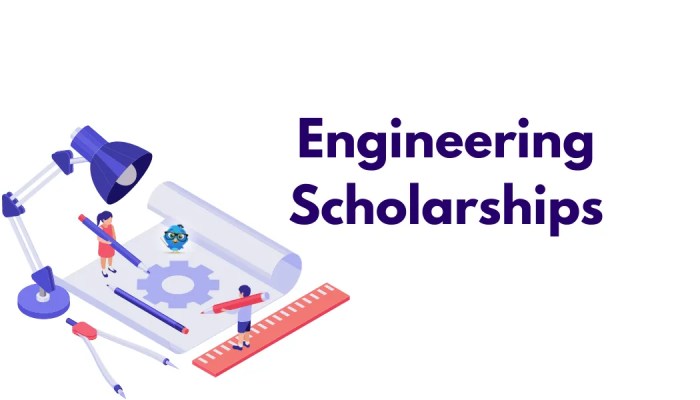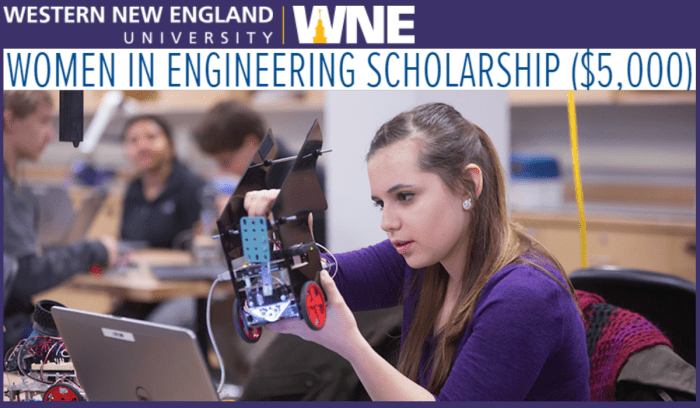Engineering scholarships represent a crucial pathway for aspiring engineers to pursue their academic goals and contribute to innovative advancements. Securing funding significantly reduces the financial burden, allowing students to focus on their studies and extracurricular pursuits. This exploration delves into the diverse types of engineering scholarships available, the eligibility requirements, and effective strategies for finding and applying for these invaluable opportunities.
From merit-based awards recognizing academic excellence to need-based grants supporting students facing financial hardship, the landscape of engineering scholarships is rich and varied. Specific engineering disciplines, such as aerospace, biomedical, and computer engineering, often attract substantial funding from various sources, including universities, professional organizations, and corporations. Understanding the nuances of each scholarship type, along with the application process, is key to success.
Types of Engineering Scholarships

Securing funding for engineering education can be challenging, but numerous scholarships exist to alleviate financial burdens. These scholarships vary widely in their eligibility criteria, funding amounts, and application processes. Understanding the different types of available scholarships is crucial for maximizing your chances of securing financial aid. This section Artikels the various categories and provides examples to guide your search.
Engineering Scholarship Categories
Engineering scholarships are broadly categorized based on their eligibility requirements and funding sources. The primary categories include merit-based, need-based, field-specific, and minority-serving scholarships. Each category offers unique opportunities for students with different backgrounds and academic achievements.
| Scholarship Type | Eligibility Criteria | Funding Amount (range) | Application Deadline |
|---|---|---|---|
| Merit-Based | High GPA, strong standardized test scores (SAT/ACT), leadership roles, extracurricular activities, and exceptional academic achievements. | $500 – $10,000+ per year | Varies widely; often in the spring or early summer for the following academic year. |
| Need-Based | Demonstrated financial need, as determined by the Free Application for Federal Student Aid (FAFSA) or similar forms. Family income and assets are assessed. | Varies widely, often covering a significant portion or all of tuition and fees. | Varies widely, often aligning with the FAFSA deadlines. |
| Field-Specific | Specific major or area of engineering study (e.g., chemical engineering, aerospace engineering, civil engineering). May require related experience or coursework. | $1,000 – $5,000+ per year | Varies depending on the specific organization or institution offering the scholarship. |
| Minority-Serving | Targeted towards underrepresented groups in engineering, such as women, African Americans, Hispanic/Latinx students, Native Americans, and other minority groups. | Varies widely; some may cover full tuition and fees. | Varies widely, often with deadlines in the spring or early summer. |
Examples of Engineering Disciplines with High Scholarship Availability
Certain engineering fields often attract a higher volume of scholarship opportunities due to industry demand and the need to attract and retain talent. For instance, aerospace engineering, often associated with national defense and space exploration, frequently offers competitive scholarships. Similarly, computer engineering, a rapidly evolving field with high industry demand, also boasts a considerable number of scholarship programs. Chemical engineering, crucial for advancements in various sectors, also tends to have a significant number of scholarship opportunities. Civil engineering, focused on infrastructure development, also attracts substantial funding from government and private entities, resulting in a broader range of scholarship options.
Eligibility Requirements for Engineering Scholarships

Securing an engineering scholarship often hinges on a combination of academic excellence, demonstrated leadership, and compelling personal qualities. Scholarship committees seek well-rounded individuals who not only possess the intellectual capacity to succeed in rigorous engineering programs but also show promise as future leaders and innovators in the field. This section details the key eligibility criteria commonly found in engineering scholarship applications.
Academic Requirements
Most engineering scholarships prioritize strong academic performance. A high Grade Point Average (GPA) is almost universally required, with many programs specifying a minimum GPA of 3.0 or higher on a 4.0 scale. The specific GPA requirement can vary significantly depending on the scholarship provider and the competitiveness of the applicant pool. In addition to GPA, standardized test scores, such as the SAT or ACT, often play a crucial role. High scores on these tests demonstrate a student’s aptitude for academic rigor and their potential to excel in demanding engineering coursework. Some scholarships may also consider specific subject test scores in mathematics and science, reflecting the importance of a strong foundation in these critical areas. For example, a scholarship specifically for chemical engineering might place extra weight on AP Chemistry scores.
Extracurricular Activities and Leadership Roles
Beyond academics, engineering scholarships frequently evaluate applicants’ involvement in extracurricular activities and leadership roles. Participation in relevant clubs, such as robotics teams, engineering societies, or science Olympiads, showcases a student’s passion for engineering and their dedication to continuous learning. Holding leadership positions within these organizations further demonstrates organizational skills, teamwork abilities, and the capacity to motivate and inspire others. For instance, serving as president of the school’s robotics club demonstrates leadership, project management, and collaboration skills, all highly valued attributes in engineering. Active involvement in community service projects also often enhances an application, showcasing a commitment to social responsibility and well-roundedness.
Letters of Recommendation and Personal Essays
Letters of recommendation provide crucial external validation of an applicant’s capabilities and character. Strong letters from teachers, professors, counselors, or employers who can attest to the applicant’s academic abilities, work ethic, and personal qualities are invaluable. These letters should provide specific examples illustrating the applicant’s strengths and potential. The personal essay serves as an opportunity for the applicant to articulate their aspirations, motivations, and experiences in a compelling and personal manner. A well-written essay allows applicants to showcase their personality, communication skills, and the unique perspectives they bring to the field of engineering. It’s a chance to connect their academic achievements and extracurricular involvement to their future goals and demonstrate a clear understanding of the engineering profession.
Other Impactful Eligibility Factors
While GPA, test scores, extracurricular activities, and essays are standard requirements, several less common factors can significantly enhance an application.
- Demonstrated financial need: Many scholarships prioritize students facing financial hardship, making need-based scholarships an important avenue for those with limited resources.
- Specific engineering discipline focus: Scholarships often target specific engineering disciplines, such as civil, mechanical, or electrical engineering. Applications aligning with the scholarship’s focus are more likely to be successful.
- Underrepresented minority status: Many scholarships actively seek to increase diversity within the engineering field and prioritize applicants from underrepresented minority groups.
- Geographic location: Some scholarships are restricted to students residing in a particular state, region, or even a specific city. Applicants should carefully review the geographic limitations of each scholarship.
- Unique talents or skills: Exceptional skills in areas such as coding, design, or research can make an applicant stand out from the competition.
Impact of Engineering Scholarships on Students

Engineering scholarships significantly impact students’ lives, extending far beyond financial assistance. They provide crucial support, fostering academic success, enhancing career prospects, and promoting diversity within the engineering profession. The positive effects ripple outwards, influencing not only the recipients but also the broader engineering community and society as a whole.
Engineering scholarships alleviate the considerable financial burden of higher education, allowing students to focus on their studies rather than worrying about tuition fees, accommodation, and living expenses. This reduction in financial stress directly translates into improved academic performance. Students can dedicate more time to coursework, research projects, and extracurricular activities that enhance their learning experience and build essential skills. This improved focus often leads to higher GPAs, better performance on exams, and increased opportunities for research and development.
Enhanced Academic Performance and Career Prospects
Scholarships provide a supportive environment that encourages academic excellence. Students are often provided with mentorship opportunities, access to specialized resources, and networking events, all of which contribute to their professional development. This holistic approach to support goes beyond financial aid, fostering a sense of belonging and providing invaluable guidance. The increased confidence and reduced stress levels experienced by scholarship recipients often lead to higher graduation rates and improved job placement after graduation. For example, a study conducted by the National Academy of Engineering showed that scholarship recipients were significantly more likely to pursue advanced degrees and secure employment in their chosen fields compared to their non-recipient peers. This translates to higher earning potential and a greater contribution to the economy.
Contribution to Diversity and Inclusion
Engineering scholarships play a vital role in promoting diversity and inclusion within the engineering field. By targeting underrepresented groups – such as women, minorities, and students from low-income backgrounds – scholarships actively work to create a more equitable and representative workforce. These initiatives help to address historical biases and systemic inequalities that have traditionally limited access to engineering education for certain populations. For instance, many organizations specifically offer scholarships to women pursuing engineering degrees, aiming to increase the number of female engineers and improve gender balance within the profession. This active recruitment of diverse talent enriches the engineering community and fosters innovation by bringing in a wider range of perspectives and experiences.
Long-Term Benefits of Receiving an Engineering Scholarship, Engineering scholarships
The long-term benefits of receiving an engineering scholarship extend beyond immediate financial relief and improved academic performance. Scholarship recipients often develop strong networks with mentors, professors, and other professionals within the field. These networks provide invaluable career guidance and support throughout their professional lives, opening doors to internships, job opportunities, and leadership roles. The sense of accomplishment and confidence gained from overcoming financial hurdles and excelling academically contributes to greater resilience and adaptability in the face of future challenges. Furthermore, many scholarship recipients feel a strong sense of responsibility to give back to their communities and inspire future generations of engineers.
Examples of Scholarship Recipient Career Paths
Consider Maria, a recipient of a prestigious engineering scholarship who went on to earn a PhD in biomedical engineering. Her scholarship enabled her to focus on research, leading to several publications and the development of a novel medical device. She now leads a research team at a major medical technology company, contributing significantly to advancements in healthcare. Or take David, who received a scholarship supporting students from underprivileged backgrounds. His scholarship not only allowed him to pursue a degree in civil engineering but also opened doors to internships and networking opportunities. He now works as a project manager for a leading construction firm, overseeing large-scale infrastructure projects. These are just two examples illustrating the transformative impact of engineering scholarships on individuals and the broader engineering landscape. These individuals, empowered by their scholarships, are contributing meaningfully to society through their careers.
Ultimately, securing an engineering scholarship is a significant achievement, reflecting dedication, talent, and perseverance. By carefully researching available opportunities, crafting compelling applications, and understanding the diverse funding sources, aspiring engineers can increase their chances of receiving financial support. The long-term benefits extend beyond immediate financial relief, fostering academic success, career advancement, and a positive impact on the engineering profession as a whole. The journey to securing funding might require effort, but the rewards are well worth the investment.
Essential FAQs
What GPA is generally required for engineering scholarships?
While requirements vary, a GPA of 3.0 or higher is common, though many scholarships seek students with significantly higher GPAs.
Are there scholarships specifically for underrepresented groups in engineering?
Yes, many organizations offer scholarships specifically targeting women, minorities, and individuals from disadvantaged backgrounds to promote diversity and inclusion in engineering.
How important are extracurricular activities in scholarship applications?
Extracurricular activities demonstrating leadership, teamwork, and community involvement significantly strengthen applications, showcasing well-rounded individuals.
Can I apply for multiple engineering scholarships simultaneously?
Yes, applying for multiple scholarships increases your chances of securing funding. However, carefully manage deadlines to avoid conflicts.
Securing funding for an engineering education can be challenging, but numerous scholarships exist to help aspiring engineers. One excellent opportunity to consider is the turkiye burslari scholarship , which offers significant support to international students. This program, alongside many others, helps alleviate the financial burden of pursuing a degree in various engineering disciplines, making higher education more accessible.